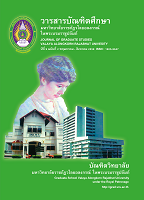กลยุทธ์การบริหารของกำนันและผู้ใหญ่บ้านเพื่อส่งเสริมความเข้มแข็งของชุมชนที่ยั่งยืน ในเขตจังหวัดภาคตะวันออกเฉียงเหนือตอนล่าง THE STRATEGIES OF ADMINISTRATION OF SUBDISTRICT AND VILLAGE HEADMEN FOR SUSTAINABLE COMMUNITIES STRENGTHENING IN LOWER NORTHEASTERN
Main Article Content
บทคัดย่อ
บทคัดย่อ
การวิจัยครั้งนี้มีวัตถุประสงค์ คือ 1) เพื่อศึกษาปัจจัยด้านความเข้มแข็งของชุมชนที่ยั่งยืนในเขตจังหวัดภาคตะวันออกเฉียงเหนือตอนล่าง 2) เพื่อศึกษาปัจจัยด้านการบริหารของกำนันและผู้ใหญ่บ้านที่มีผลต่อความเข้มแข็งของชุมชนที่ยั่งยืนในเขตจังหวัดภาคตะวันออก เฉียงเหนือตอนล่าง 3) เพื่อเสนอกลยุทธ์การบริหารของกำนันและผู้ใหญ่บ้านเพื่อส่งเสริม ความเข้มแข็งของชุมชนที่ยั่งยืน ในเขตจังหวัดภาคภาคตะวันออกเฉียงเหนือตอนล่างโดยใช้การวิจัยแบบผสานวิธี ประกอบด้วยการวิจัยเชิงปริมาณและการวิจัยเชิงคุณภาพ การวิจัยเชิงปริมาณดำเนินการโดยศึกษากลุ่มตัวอย่างจำนวน 400 คน ที่เป็นประชาชนอาศัยในพื้นที่จังหวัดภาคตะวันออกเฉียงเหนือตอนล่างที่ได้มาโดยการสุ่มแบบหลายขั้นตอนและคำนวณขนาด กลุ่มตัวอย่างตามสูตรของทาโร ยามาเน่ เก็บข้อมูลด้วยแบบสอบถาม วิเคราะห์ข้อมูลด้วยสถิติค่าเฉลี่ย ส่วนเบี่ยงเบนมาตรฐาน และการวิเคราะห์ถดถอยแบบขั้นตอน การวิจัยเชิงคุณภาพดำเนินการโดยการสัมภาษณ์เชิงลึกผู้ให้ข้อมูลสำคัญ จำนวน 25 คน ที่เป็นผู้ว่าราชการจังหวัด 2 คน ปลัดจังหวัด 2 คน นายอำเภอ 2 คน ปลัดอำเภอ 5 คน พัฒนาการอำเภอ 2 คน พัฒนากร 2 คน นายกเทศมนตรีตำบล 1 คน นายกองค์การบริหารส่วนตำบล 2 คน กำนัน 4 คน และผู้ใหญ่บ้าน 3 คน ในพื้นที่ภาคตะวันออกเฉียงเหนือตอนล่างได้มาโดยการเลือกแบบเจาะจงวิเคราะห์ข้อมูลโดยการวิเคราะห์เชิงเนื้อหาและการตีความ
ผลการวิจัยพบว่า
1) ปัจจัยด้านความเข้มแข็งของชุมชนที่ยั่งยืนในเขตจังหวัดภาคตะวันออกเฉียงเหนือตอนล่าง โดยรวมอยู่ในระดับมาก ( =4.17, S.D.=0.61) เมื่อพิจารณาเป็นรายด้านพบว่า ด้านการเป็นชุมชนที่พึ่งตนเองได้มีค่าสูงสุด (
=4.23, S.D.= 0.64) ลงมาได้แก่ ด้านการมีภูมิคุ้มกัน (
=4.17, S.D.= 0.66) ด้านคุณภาพชีวิตประชาชน (
=4.13, S.D.= 0.72) และด้านการอนุรักษ์ทรัพยากรอย่างยั่งยืน (
=4.13, S.D.= 0.71) ตามลำดับ โดยด้านการเป็นชุมชนที่พึ่งตนเองได้มีค่าสูงสุดเนื่องจากประชาชนในชุมชนเห็นว่าการดำเนินชีวิตในสังคมที่มั่นคงต้องพึ่งพาตนเองโดยพึ่งพารัฐเท่าที่จำเป็นเท่านั้นและด้านการอนุรักษ์ทรัพยากรอย่างยั่งยืนมีค่าต่ำสุด เนื่องจากประชาชนยังไม่เห็นความสำคัญในการอนุรักษ์ทรัพยากรเพราะยังไม่ได้รับผลกระทบมากนัก
2) ปัจจัยด้านการบริหารของกำนันและผู้ใหญ่บ้านที่มีผลต่อความเข้มแข็งของชุมชนที่ยั่งยืนในเขตจังหวัดภาคตะวันออกเฉียงเหนือตอนล่าง ประกอบด้วยปัจจัยที่สำคัญ 8 ประการ โดยพิจารณาตามสมการพยากรณ์ ซึ่งลำดับจากสูงไปต่ำ ได้แก่ ด้านการขจัดมลภาวะด้านการรักษามรดกทางสังคมที่นำมาใช้ในการครองชีวิตด้านการให้การศึกษาแก่ประชาชนในหมู่บ้านด้านการป้องกันการลักลอบตัดไม้ทำลายป่าด้านการดำเนินการตามหลักปรัชญาเศรษฐกิจพอเพียงด้านกฎหมายด้านการบริหารจัดการน้ำเพื่อการเกษตร และด้านการรักษาจารีตประเพณี โดยปัจจัยดังกล่าวสามารถอธิบายความผันแปรของการส่งเสริมความเข้มแข็งของชุมชนที่ยั่งยืน ได้ร้อยละ 77.90 (R2= .779) ที่ระดับนัยสำคัญทางสถิติ 0.05
3) กลยุทธ์การบริหารของกำนันและผู้ใหญ่บ้านเพื่อส่งเสริมความเข้มแข็งของชุมชนที่ยั่งยืนในเขตจังหวัดภาคตะวันออกเฉียงเหนือตอนล่างที่เสนอประกอบด้วยกลยุทธ์ การบริหารที่สำคัญ 9 ประการ คือ (1) กลยุทธ์ด้านการเป็นชุมชนที่พึ่งตนเองโดยชุมชนต้องพัฒนาศักยภาพให้พึ่งตนเองได้ ในการประกอบอาชีพได้อย่างมั่นคง ซึ่งควรพึ่งพารัฐเท่าที่จำเป็นเท่านั้น (2) กลยุทธ์ด้านการอนุรักษ์สิ่งแวดล้อม โดยการให้ความรู้เกี่ยวกับมลภาวะไม่ทำลายสิ่งแวดล้อม มีการออกกฎ ระเบียบของหมู่บ้าน และปลูกจิตสำนึกการมีส่วนร่วมของประชาชนในการอนุรักษ์สิ่งแวดล้อม (3) กลยุทธ์ด้านการป้องกันการลักลอบตัดไม้ทำลายป่า โดยออกกฎของหมู่บ้านเกี่ยวกับการป้องกันการลักลอบตัดไม้ทำลายป่า จัดตั้งคณะกรรมการป้องกันการลักลอบตัดไม้ทำลายป่าประจำหมู่บ้าน และการปลูกจิตสำนึกให้ประชาชน (4) กลยุทธ์ด้านการรักษามรดกทางสังคมที่นำมาใช้ในการครองชีวิต โดยการสืบสานการอนุรักษ์มรดกทางสังคม รักษาภูมิปัญญาท้องถิ่นที่สืบทอดมาแต่บรรพบุรุษ (5) กลยุทธ์ด้านการรักษาจารีตประเพณีโดยการส่งเสริมให้ประชาชนรักษาหลักปฏิบัติตามวิถีชีวิตของตนและวัฒนธรรมที่มีมาแต่โบราณ (6) กลยุทธ์ด้านการพัฒนาการศึกษาของประชาชนโดยการส่งเสริมให้ประชาชนรักการเรียนรู้และให้ความรู้แก่ประชาชนในการประกอบอาชีพ (7) กลยุทธ์ด้านการดำเนินการตามหลักปรัชญาเศรษฐกิจพอเพียงเป็นการน้อมนำหลักปรัชญาของพระบาทสมเด็จพระเจ้าอยู่หัวมาใช้ดำเนินชีวิตทุกระดับ 8) กลยุทธ์ด้านการบริหารจัดการน้ำเพื่อการเกษตรโดยการจัดทำระเบียบการใช้น้ำที่เหมาะสม มีคณะกรรมการบริหารจัดการน้ำและมีการพัฒนาแหล่งน้ำ และ (9) กลยุทธ์ด้านการบังคับใช้กฎหมายโดยส่งเสริมให้ประชาชนปฏิบัติตามกฎหมาย และปลูกฝังวินัยแก่ประชาชน
ABSTRACT
The objectives of this research were 1) to study the factors of communities strengthening in lower Northeastern provinces, 2) to study the administrative factors of Subdistrict and Village Headmen affecting the sustainable communities streng the ning in lower Northeastern provinces and 3) to propose the strategies of administration of Subdistrict and Village Headmen for sustainable communities strengthening in lower Northeastern provinces. This study was a mixed methods research of quantitative and qualitative approaches. The quantitative research was conducted by study the sample of 400respondents who were people residing in lower Northeastern provinces and they were selected by multi-stage random sampling. The sample size was calculated by using Taro Yamane’s formula. The data were collected through questionnaires and were analyzed by statistics consisted of mean, standard deviation, and Stepwise Multiple Analysis. The quantitative research was conducted through in-depth interviewing 25key informants consisted of 2 Provincial Governors, 2 Provincial Deputy Governors, 2 District Chiefs, 5 District Deputy Chiefs, 2 Chief of Permanent Officials, 2 Chief of Permanent Deputy Officials, 1 Subdistrict Municipality Major, 2 Chiefs Subdistrict Administrative Organization, 4 Subdistrict Headmen, and 3 Village Headmen in the lower Northeastern provinces. They were selected purposively and the data were analyzed by content analysis and interpretation.
The research results revealed that:
1) The administrative factors of Subdistrict and Village Headmen affecting the sustainable communities strengthening in overall was at the high level (=4.17, S.D.=0.61), while considered in each aspect found that the aspect of being self- reliance was at the highest (
=4.23, S.D.=0.64), followed by the aspect of having immunity (
=4.17, S.D.=0.66), the aspect of quality of life (
=4.13, S.D.=0.72), and the aspect sustainable resource preservation (
=4.13, S.D.=0.71), respectively. The aspect of being self- reliance was at the highest as the people thought that their social stability should be optained by their own performances and they should get the state support only necessary. The aspect of sustainable resource preservation was at the lowest as the people did not realize in resource preservation as they were not yet affected by their impacts.
2) The administrative factors of Subdistrict and Village Headmen affecting the strengthening sustainable communities in lower Northeastern provinces composed of 8 principle variables as in the prediction equation ranking from the highest: the pollution eliminating, followed by the social heritage preservation for living the education for people providing, the national forest deforestation, the living with self-sufficiency economy philosophy, the law, the water management for agriculture and the tradition preservation. These eight variables could explain the variation of sustainable communities strengthening in lower Northeastern provinces at 77.90 percent (R2=0.779) at the statistical level of confidence 0.05.
3) The proposed strategies of administration of the Subdistrict and Village Headmen for sustainable communities strengthening in lower Northeastern provinces consisted of 9 administrative strategies as (1) strategy for being self-reliance community by developing their own career potential firmly and getting the state support only necessary, (2) strategy for resource preservation by providing the knowledge of pollutions and not destroy the environment and creating the awareness in environment preservation, (3) strategy for deforestation protection by creating the community rule not to deforest, establishing community committee for deforestation protection and forest loving forest awareness creation, (4) strategy for social heritage preservation by preserving the social heritage and maintaining local wisdom, (5) strategy for local tradition preservation by promoting their traditional life-styles based on their old cultures, (6) strategy for education developing by enhancing the awareness of the people in having the learning culture and providing the career knowledge for the people, (7) strategy for living with self-sufficiency economy philosophy by implying the principles of His Majesty the King to the peoples living in all level, (8) strategy for agriculture water management by creating the appropriate regulations for water consumption, having the water committee and developing the water resources and (9) strategy for law enforcement by promotion the law awareness to the people and establishing the relevant disciplines to the people. Keywords: Strategy, Administration, The strengthening of community.Article Details

อนุญาตภายใต้เงื่อนไข Creative Commons Attribution-NonCommercial-NoDerivatives 4.0 International License.
บทความทุกเรื่องได้รับการตรวจความถูกต้องทางวิชาการโดยผู้ทรงคุณวุฒิ ทรรศนะและข้อคิดเห็นในบทความ Journal of Global of Perspectives in Humanities and Social Sciences (J-GPHSS) มิใช่เป็นทรรศนะและความคิดของผู้จัดทำจึงมิใช่ความรับผิดชอบของบัณฑิตวิทยาลัย มหาวิทยาลัยราชภัฏวไลยอลงกรณ์ ในพระบรมราชูปถัมภ์ กองบรรณาธิการไม่สงวนสิทธิ์การคัดลอก แต่ให้อ้างอิงแหล่งที่มา


